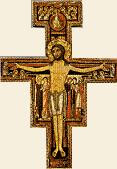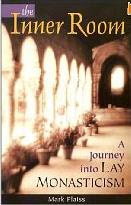 For starters, I figured that I should give a very short background of the person who started it all: Brother Francis.
For starters, I figured that I should give a very short background of the person who started it all: Brother Francis.Early Years
Francis, was born at Assisi in Umbria, in 1181 or 1182—the exact year however remains uncertain. Francis, whose legal name was Giovanni, was one of several children of Pietro and Pica Bernardone. His father changed his name to Francesco, through fondness for France.
Young Francis also showed little liking for the life of a merchant's career, but indulged in parties and delighted in fine, expensive clothes.
Conversion
At the age of twenty, Francis went out with the Assisians to fight the Perugians. Defeated, Francis with others, was held captive for more than a year in Perugia. Recovering from an illness he contracted from prison, Francis turned his thoughts to the emptiness of the life he had been leading. He soon began to seek prayer and solitude and had totally given up his wasteful ways.
An encounter with a poor leper, a pilgrimage to Rome, and soon, a vision of the Divine in the forsaken chapel of St. Damiano were all enough to get Francis going – He was resolved to repair the Church – literally.
Francis sold much of his father’s merchandise to generate the needed funds for the restoration of St. Damiano Church. The elder Bernardone was angered at his son's conduct. Having been taken before the bishop, Francis totally surrendered all worldly goods, saying to the elder Bernardone: ‘I have called you my father on earth; henceforth I desire to say only 'Our Father who art in Heaven.’
Francis was known to restore three chapels: San Damiano, St. Peter's, and St. Mary of the Angels at a spot called the Porziuncola and works of charity, more especially in nursing the lepers.
On one February morning in 1208, Francis, hearing Mass, was struck by the Gospel passage which told how the disciples of Christ were to possess nothing for their journey, and that they were to exhort sinners to repentance. Francis took these words as if spoken directly to himself, and soon threw away his shoes, cloak, staff, and empty wallet. Having obtained a coarse woolen tunic, and tied it round him with a knotted rope, Francis went forth at once exhorting the people to penance, brotherly love, and peace.
The Minor Brothers
Francis soon drew others to his new movement Bernard of Quintavalle, and Peter of Cattaneo. They sought to learn God's will in their regard by thrice opening at random the book of the Gospels on the altar. Each time it opened at passages where Christ told His disciples to leave all things and follow Him. ‘This shall be our rule of life’, exclaimed Francis, and led his companions to the public square, where they forthwith gave away all their belongings to the poor. After this they procured rough habits like that of Francis, and built themselves small huts near his at the Porziuncola. When the number of his companions had increased to eleven, Francis found it expedient to draw up a written rule for them. This was the start of the group later known as the Order of the Lesser Brothers.
The Pool Ladies
During the Lent of 1212, Clare, a young heiress of Assisi, moved by the saint's preaching, sought Francis, and begged to be allowed to embrace the new manner of life he had founded. By his advice, Clare, secretly left her father's house on the night following Palm Sunday. Francis cut off her hair, clothed her in the Minorite habit and thus received her to a life of poverty, penance, and seclusion. Clare stayed at Benedictine monastery near Assisi, until Francis established them at St. Damian's. With Francis, Clare would start a movement of the Poor Ladies.
The Brethren of Penance
The year 1218 Francis devoted to missionary tours in Italy. Admiring crowds, unused for the rest to anything like popular preaching, followed Francis from place to place. His exhortations of the people, touched even the hardest, and Francis became in sooth a very conqueror of souls. Thus it happened, in a small village near Assisi, that the whole congregation was so moved, that they presented themselves to him and begged to be admitted into his order. Francis devised another Order, the Brothers and Sisters of Penance, which was a middle state between the world and the cloister. This fusion of the religious and the secular state in the Brothers and Sisters of Penance was one of the greatest achievements of Francis.
Last Days
Early in August, 1224, Francis retired with three companions to a place called ‘La Verna’ to keep a forty days fast. It was here that he received the Stigmata – the visible marks of the five wounds of the Crucified.
After the reception of the stigmata, Francis suffered increasing pains throughout his frail body, already broken by continual mortification. Worn out, moreover, as Francis now was by eighteen years of unremitting toil, his strength gave way completely, and at times his eyesight so far failed him that he was almost wholly blind.
The saint's last days were passed at the Porziuncola in a tiny hut, near the chapel. Francis died on a Saturday evening October 3, 1226.










